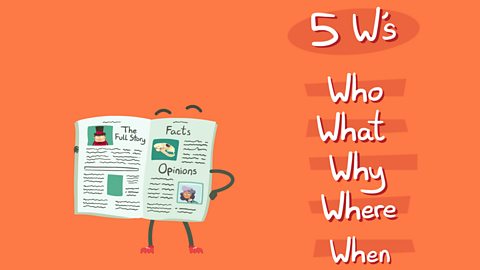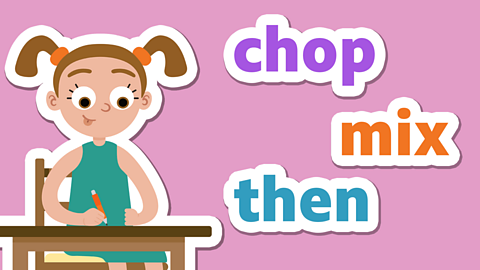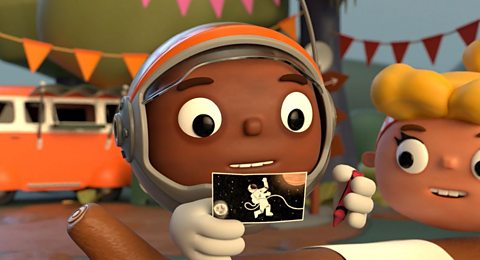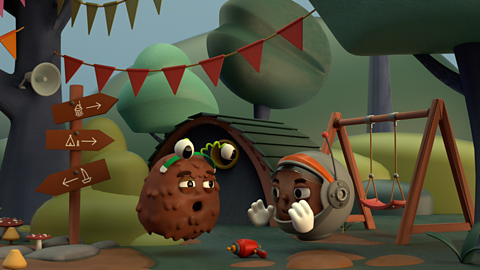Watch: What are the features of newspapers?
Newspapers are designed to share important information with people about what is going on in the world.
Familiarise yourself with newspaper reports by watching this fun video.
Learn all about what's included in a newspaper report.
Watch: Features of a newspaper article
Watch this video to learn more about the key features of a newspaper report. Make notes if you find them helpful!
All the top tips you need to turn your story into a newspaper article!
How to write a news article.
Whether it's local, national or international, writing articles on important events is a useful skill to learn. Where to begin when you're writing the news article?
First, you need some news. There has been a break in at this house. The only witnesses are the family.
The burglar has eaten their food and destroyed some furniture.
A good reporter will start by finding out the facts. What happened? When? Who was involved? Where? Why?
Once you have sorted all of your notes and organised the facts, you're ready to write the article.
Every good news article needs a headline. Something attention grabbing: 'Bears Blame Blonde For Burglary.'
Very nice. Everyone loves alliteration in a headline. The same letter or sound at the beginning of each word.
It then needs a subheading to provide a bit more detail about the story.
'Burglar steals porridge and destroys house in ransacking rampage.'
Your first paragraph should summarise and describe what happened as accurately as possible: 'In the early hours of this morning, a burglar broke into the home of the three bears in rural Bearwick. Police are looking for a blonde haired suspect.'
Use your notes to write additional paragraphs and give your reader more detail about what has happened.
You might want to add quotes from your witnesses, using quotation marks.
Printed newspapers have a traditional layout in columns like this.
If your news article is online, however, you won't need these.
But remember both need paragraphs and you should write in a formal way in the third person using pronouns like he, she, it or they.
A well written article will help those who know nothing about the event understand what happened.
Don't forget to add your name to the the article, but leave out your personal opinions. Stick to the facts. The what, when, who, where and why.
So that the article you write can be just right.
Key features of a newspaper
- Newspaper name
The name of the newspaper is always at the top of the page.
- Headline
A headline is an eye-catching title for your story, which summarises the information in just a few words. Newspapers often use alliteration to make their headlines sound really interesting.
- Short subtitle
The subtitle is a short title that gives more information about the report.
- Pictures
Pictures usually have captions beneath them to explain what is being shown.
- Conclusion paragraph
The conclusion paragraph can explain what might happen next.
What writing style is used in newspaper articles?
- 5Ws
The first paragraph should contain all of the 5Ws - what, where, when, who and why.
- Clear paragraphs
Each paragraph should give more detail about the story and be presented in a clear way.
- Direct and indirect/reported speech
Can be used to show the what other people have said about the story.
- Facts
Facts or statistics can be used to support your points and avoid using your own opinion.
- Formal language
Avoid chatty, friendly language in your report as it should be written to inform.
- Third person
Newspaper reports are written in the third person using the names of those involved and pronouns such as ÔÇÿheÔÇÖ, ÔÇÿsheÔÇÖ or ÔÇÿtheyÔÇÖ.
- Past tense
The main part of the report should be written in the past as the event has already happened.
Activity 1
Activity 2
Activity 3

Read this Newsround report about Indian tigers.
Then answer the five questions below.ÔÇÄ
What is the report about? ÔÇÄ
Who is involved in the story? ÔÇÄ
When did the events take place? ÔÇÄ
Where did the events take place? ÔÇÄ
Why is this happening? ÔÇÄ

Activity 4
Read this news article all about an incredible eight-mile wall of prehistoric paintings. Then answer the following questions:
- What is the first thing at the very top of the page?
- Does the first paragraph give away all the information about the story? Why do you think this is?
- Is the article written in the past tense? Find a verb to prove this.
- Find an example where a quote is used in the article. Does it express a fact or an opinion?
- Does the article answer the 5 Ws: what, when, who, where, why?
- What do the following bold phrases from the article suggest?
The paintings are believed to be at least 12,500 years old.
It hasnt been confirmed who made the drawings but some people think they could have been
You can check your answers using this .
Activity 5
Choose one of these Newsround reports to watch.
What needs to be done to get more girls into motorsport?
Six-year-old boyÔÇÖs space ambition ÔÇÿinspiresÔÇÖ NASA
Now, imagine you are a journalist reporting on the same story. Write a well-structured, informative newspaper report about that story.
Top tip!
Remember to plan before you write!
- What is the name of your newspaper?
- What is the headline of your article?
- Plan the 5 Ws to use in your introduction
- Think about your three main paragraphs. What will the main point be in each one?
- What quotations will you include?
- How will you end your article?
Top tip!
Remember to plan before you write!
- What is the name of your newspaper?
- What is the headline of your article?
- Plan the 5 Ws to use in your introduction
- Think about your three main paragraphs. What will the main point be in each one?
- What quotations will you include?
- How will you end your article?
Challenge
In your closing paragraph, can you include a sentence that looks forward to the future?
Play our fun English game Crystal Explorers. gamePlay our fun English game Crystal Explorers
Use grammar, punctuation and spelling skills to explore jungles, caves and tombs on your mission!

More on Reasons for writing
Find out more by working through a topic
- count5 of 5

- count1 of 5

- count2 of 5
